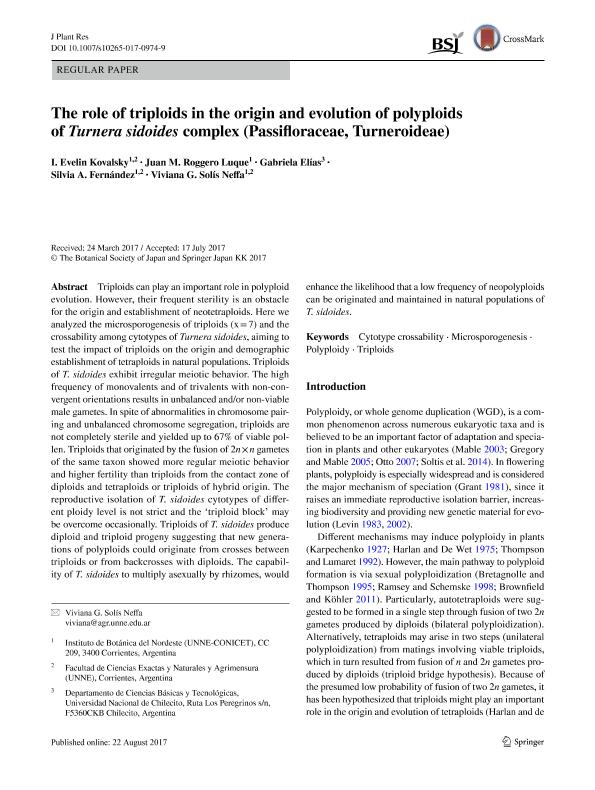Artículo
The role of triploids in the origin and evolution of polyploids of Turnera sidoides complex (Passifloraceae, Turneroideae)
Kovalsky, Ivana Evelìn ; Roggero Luque, Juan Manuel
; Roggero Luque, Juan Manuel ; Elias, Gabriela; Fernández, Silvia Andrea
; Elias, Gabriela; Fernández, Silvia Andrea ; Solis Neffa, Viviana Griselda
; Solis Neffa, Viviana Griselda
 ; Roggero Luque, Juan Manuel
; Roggero Luque, Juan Manuel ; Elias, Gabriela; Fernández, Silvia Andrea
; Elias, Gabriela; Fernández, Silvia Andrea ; Solis Neffa, Viviana Griselda
; Solis Neffa, Viviana Griselda
Fecha de publicación:
08/2017
Editorial:
Springer Tokyo
Revista:
Journal of Plant Research
ISSN:
0918-9440
e-ISSN:
1618-0860
Idioma:
Inglés
Tipo de recurso:
Artículo publicado
Clasificación temática:
Resumen
Triploids can play an important role in polyploid evolution. However, their frequent sterility is an obstacle for the origin and establishment of neotetraploids. Here we analyzed the microsporogenesis of triploids (x=7) and the crossabilty among cytotypes of Turnera sidoides, aiming to test the impact of triploids on the origin and demographic establishment of tetraploids in natural populations. Triploids of T. sidoides exhibit irregular meiotic behavior. The high frequency of monovalents and of trivalents with non-convergent orientations results in unbalanced and/or non-viable male gametes. In spite of abnormalities in chromosome pairing and unbalanced chromosome segregation, triploids are not completely sterile and yielded up to 67% of viable pollen. Triploids that originated by the fusion of 2n × n gametes of the same taxon showed more regular meiotic behavior and higher fertility than triploids from the contact zone of diploids and tetraploids or triploids of hybrid origin. The reproductive isolation of T. sidoides cytotypes of different ploidy level is not strict and the ?triploid block? may be overcome occasionally. Triploids of T. sidoides produce diploid and triploid progeny suggesting that new generations of polyploids could originate from crosses between triploids or from backcrosses with diploids. The capability of T. sidoides to multiply asexually by rhizomes, would enhance the likelihood that a low frequency of neopolyploids can be originated and maintained in natural populations of T. sidoides.
Palabras clave:
Cytotype
,
Crossability
,
Microsporogenesis
,
Polyploidy
,
Triploids
Archivos asociados
Licencia
Identificadores
Colecciones
Articulos(IBONE)
Articulos de INST.DE BOTANICA DEL NORDESTE (I)
Articulos de INST.DE BOTANICA DEL NORDESTE (I)
Citación
Kovalsky, Ivana Evelìn; Roggero Luque, Juan Manuel; Elias, Gabriela; Fernández, Silvia Andrea; Solis Neffa, Viviana Griselda; The role of triploids in the origin and evolution of polyploids of Turnera sidoides complex (Passifloraceae, Turneroideae); Springer Tokyo; Journal of Plant Research; 8-2017; 1-13
Compartir
Altmétricas



